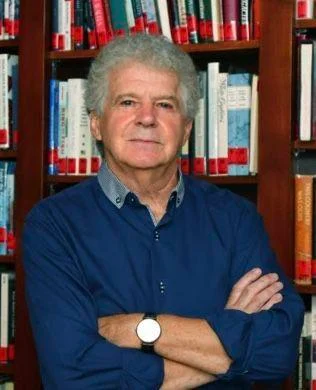
Dartmouth professor Dr. Colin Calloway Courtesy of Richards Free Library
NEWPORT- Dartmouth professor Dr. Colin Calloway was recently presented with the 2022 Sarah Josepha Hale Award during a ceremony at the Newport Opera House.
The award, which is given by the trustee of the Richards Free Library in Newport, is given in recognition of a distinguished body of work in the field of literature and letters.
Calloway has published 14 titles within the field of Native American Studies. His book “The Indian World of George Washington” was a National Book Award finalist, and won a number of awards, including the Journal of the American Revolution Book of the Year Award and the American Revolution Round Table of Philadelphia Book Award.
The Sarah Josepha Hale Award has been given to distinguished writers since 1956 when it was created by Raymond and Barbara Holden. The first award was given to Robert Frost and has since been given to a number of famed writers over the years including Ogden Nash, Ken Burns, Arthur Miller, and Jodi Picoult. Nominees for the award must meet a set of criteria including being born or residing in New England, being a literary person and willing to present a speech at the ceremony.
Well known and regarded New Hampshire author Ernest Herbert was there to present the award to Calloway. Herbert, a Keene native, is best known for his “The Darby Chronicles” and himself worked as a Dartmouth professor for over two decades.
“I consider it not only a pleasure but an honor to introduce our 2022 winner of the SJH award for one big reason. Professor Colin Calloway has deepened our understanding of American history,” Herbert said of Calloway and would later go on to add, “He further expands our understanding of the first president and his administration but he expands our understanding of the country by detailing through documented storytelling a theme that resounds throughout his work which is that indigenous peoples throughout North America played a huge role in the creation of a nation we call the United States.”
Calloway then took the stage offering to attendees not only a better understanding of his background, but the background of our nation and how the influence of Native Americans affected, and still affects, this country. He also spoke at length about how the inclusion of the Native American narrative to our history is paramount to us understanding our past.
“I do American history with Indians in it. That might not seem like much but it actually is hugely important because I believe that without native americans in American history, our history doesn’t make a lot of sense,” Calloway said.
Later on in the evenings speech, he would also inform the audiences,“We need a history of the American revolution that is inclusive to bring us together, but a history that is inclusive will have to acknowledge the diverse experience of different people. Maybe, heaven forbid, entertain the notion that freedom could mean different things to different people in different places at different times,”
Calloway also warns that there are people within our government that are complicit in hiding what may be deemed to be the darker parts of our nation’s history, and that only by discussing these periods of America’s past can we progress as a nation. “We have politicians who seem to be more intent on protecting our children from teachers who might acknowledge the realities of slavery and indigenous disposition on than they are protecting them from being gun down in class rooms, this is crazy,” he stated.
Calloway closed out his speech with a reading from his book “The Indian World Of George Washington” and entered a Q&A portion of the evening with audience members in attendance. Calloway closed out the evening pointing out the importance of all of us remembering that we reside on Abenaki land and that the foundation of this country does not happen without Native American influence. “Great nations deserve great histories. Great histories require looking at the past full frontal and acknowledging what worked and what didn’t work,” Calloway said.